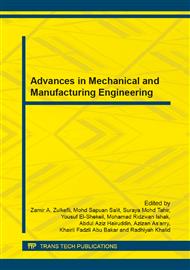[1]
A. P. Barbosa-póvoa. Sustainable Supply Chains : Key Challenges, in 10th international Symposium on Process Systems Engineering, (2009), vol. 27, no. 2008, p.127–132.
DOI: 10.1016/s1570-7946(09)70242-1
Google Scholar
[2]
W. J. Stevenson, Operations Management, 7th edition. New York: McGraw-Hill/Irwin (2002).
Google Scholar
[3]
C. Jones. Supply Chain Management - Key Issue, BPICS Control (1989) p.23–27.
Google Scholar
[4]
H. Lee, and C. Billington. Managing Supply Chain Inventory : Pitfalls and Opportunities, MIT Sloan eManagement Review, vol. 33, no. 3 (1992 )p.65–73.
Google Scholar
[5]
V. Jain, S. Wadhwa and S. G. Deshmukh: International Journal of Production Research, vol. 47, no. 11(2009) p.3013–3039.
Google Scholar
[6]
A. Nagurney, Supply Chain Network Economics: Dynamics of Prices, Flows, and Profits. Edward Elgar Publishing (2006).
Google Scholar
[7]
C. M. Harland. Supply Chain Management : Relationships, Chains and Networks, vol. 7, no. March (1996).
Google Scholar
[8]
M. C. Cooper, D. M. Lambert and J. D. Pagh: International Journal of Logistics Management, vol. 8, no. 1 (1997) p.1–13.
Google Scholar
[9]
T. Baltacioglu, E. Ada, M. D. Kaplan, O. Yurt and Y. C. Kaplan. A New Framework for Service Supply Chains A New Framework for Service Supply Chains, The Service Industries Journal, vol. 27, no. 2 (2007) p.105–124.
DOI: 10.1080/02642060601122629
Google Scholar
[10]
World Commission on Environment and Development WCED, Our common future, New York (1987).
Google Scholar
[11]
National Academy Press, Our common journey: A transition toward sustainability (1999).
Google Scholar
[12]
J. Linton, R. Klassen and V. Jayaraman: Journal of Operations Management, vol. 25, no. 6 (2007) p.1075–1082.
Google Scholar
[13]
R. N. Stavins, A. F. Wagner and G. Wagner: Economic Letters, vol. 79, no. 3 (2003) p.339–343.
Google Scholar
[14]
Z. Molamohamadi, N. Ismail, Z. Leman and N. Zulkifli. Sustainable Human Resource Management, in HRM&PD 2013 Proceedings (Print ISSN: 2251-2349, E-Periodical: 2251-2357) (2013) pp.36-39.
DOI: 10.1037/e572392013-007
Google Scholar
[15]
R. Baud. The concept of sustainable development: aspects and their consequences from a social-philosophical perspective. YES Youth Encounter on Sustainability Summer Course material, Braunwald, Switzerland (2008).
Google Scholar
[16]
M. Garetti and M. Taisch. Sustainable manufacturing: trends and research challenges, Production Planning & Control: The Management of Operations, vol. 23, no. 2–3 (2012) p.83–104.
DOI: 10.1080/09537287.2011.591619
Google Scholar
[17]
Z. Molamohamadi and N. Ismail: International Journal of Materials, Mechanics and Manufacturing, vol. 1, no. 1 (2013) p.1–5.
Google Scholar
[18]
J. Elkington. Towards the sustainable corporation: California Management Review, Vol. 36, no. 2 (1994) p.90–100.
Google Scholar
[19]
National Research Council American Management Association, Creating a sustainable future, A global study of current trends and possibilities, New York (2007).
Google Scholar
[20]
M. Shahbazpour and R. H. Seidel. Using sustainability for competitive advantage, in 13th CIRP International Conference on Life Cycle Engineering (2006) p.287–292.
Google Scholar
[21]
C. Brindley and L. Oxborrow. Aligning the sustainable supply chain to green marketing needs: A case study, Industrial Marketing Management, (in press).
DOI: 10.1016/j.indmarman.2013.08.003
Google Scholar
[22]
A. Ashby, M. Leat and M. Hudson-Smith: Supply Chain Management: An International Journal, vol. 17, no. 5 (2012) p.497–516.
DOI: 10.1108/13598541211258573
Google Scholar


